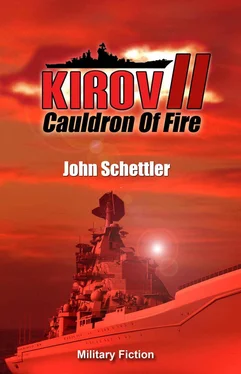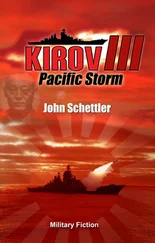“I agree, Admiral,” said Fedorov. “Suppose we leave off this line of argument and think to our more immediate needs— survival . Destroying Malta, Gibraltar or smashing the Sixth Army would certainly have a dramatic effect on the war, but haven’t we seen enough death and destruction already on this cruise?”
Zolkin had been listening to everything intently. He was not a military man, and so did not entirely grasp the implications of what Karpov and Fedorov were discussing. Instead he was watching the men, gauging their emotions, and sounding out things on another level. Now he spoke with a pointed remark that changed the tone of the argument.
“You have all been discussing what we might do, what we are capable of doing, and yes, what the consequences may be in the end, but speak now to what we should do…” The implication of some moral element in the decision was obvious. “Yes, we can smash our way through these ships, and blacken Malta or Gibraltar if we so decide, but should we? Simply to secure our own lives and fate? How many will die if we attempt this?”
The sharp alarm of general quarters came in answer, long and strident in the still air. Karpov sat up stiffly, his reflex for battle immediately apparent and a new light in his eyes. “Listen, Zolkin,” he said quickly, a finger pointing to the scrambling sound of booted feet on the decks above them. “Hear that? This is no longer a question of what we should do, but what we must do. It is either that, or we go to the bottom of the sea like so many before us.”
“Mister Fedorov, I think you should get to the command bridge,” said Volsky.
Fedorov was already up and heading for the hatch but Karpov pulled at him: “Fedorov,” he said quickly. “You can cross circuit the Klinok SAM system with any other radar. Rodenko—bypass the damaged systems and target via your primary search array. After that the missiles can operate on their own!”
Volsky, nodded and then gave one final order. “Protect the ship, Mister Fedorov. Do what you must. Rodenko, Tasarov—get moving!”
“I never worry about action, but only inaction… If you are going through hell, keep going… A pessimist sees the difficulty in every opportunity; an optimist sees the opportunity in every difficulty.”
~ Prime Minister, Sir Winston Churchill
By the timethey reached the bridge the danger was acute. The younger officers there had picked up a single airborne contact that seemed to be passing astern, moving on a heading away from the ship. They watched it for ten minutes before Kalinichev on radar noticed a group of several planes coming on screen from the south. They were out over the sea, bypassing the Sicilian mainland and on a heading towards Kirov . They tracked the contact nervously for another ten minutes until, at a 130 miles out, they were convinced it was a threat and sounded battle stations.
Five minutes later Fedorov and the other senior officers rushed onto the bridge, and Rodenko assumed his station, immediately cross indexing the Klinok SAM system with their main Fregat 3D Search Radars as Karpov advised. It took him five minutes to bypass some damaged circuits and establish a link, and by the time he was ready to feed fire control data the contact was 80 miles out and closing at 300 miles per hour. It would reach them in fifteen minutes.
“We can use the S-300 system at once,” he said. “It has the range to engage now.”
Fedorov considered his options, wishing he knew more about the contact, but concluding it was most likely long range fighters or torpedo bombers off Malta. Its course made it obvious that it was vectoring in on a designated target. The ship was most likely spotted by the recon aircraft that was dismissed by the junior officers as no threat. It was obvious that Kirov had been spotted again, and was now targeted for a strike mission, yet he hesitated, realizing that he was now about to intervene in the history of this battle and possibly kill these planes and crews when they might have survived and made some significant contribution to the battle, or even the war at a later time. Volsky’s last words came to him again, “Protect the ship, Mister Fedorov. Do what you must…” He could engage now with the longer range S-300s, or wait until the planes moved inside forty-five kilometers to use the medium range system. He did not have long to decide.
“We’ll wait,” he said at last. They had only forty-seven more S-300s in inventory, and twice that number of Klinok SA-N-92 missiles. “Activate our Klinok missile system, Mister Samsonov, and prepare to fire.”
“Battery keyed and ready,” said Samsonov.
The missiles were installed both forward and aft on the ship, available in batteries of eight with one missile firing every three seconds. They were deployed in vertical silos beneath the deck, and would eject by catapult and decline towards their aiming point by means of a dynamic gas jet before igniting their rocket engines.
As he waited, Fedorov realized he was now judge, jury and executioner sentencing men he could not see or ever know to death, along with everyone they might ever sire, for all generations to come. He felt a tremor in his hand as he reached to adjust the fit of his cap, and when he spoke his voice sounded thin and detached. He knew now how the Admiral must have felt when he first engaged the British, and also had a taste of Karpov’s mindset when he stood in command of the battle.
“Fire at forty-five kilometers.”
“Aye, sir.”
The minutes seemed to extend interminably and tension elevated as they waited. Rodenko continued to call out range intervals on the contact, counting down audibly for Samsonov. At forty-five kilometers Samsonov acted reflexively, dispassionately, even as he had in previous engagements, and toggled the firing switch for launch. He was going to fire off a barrage of six missiles, holding the final two in the battery as a reserve should they be needed.
A claxon droned and warning lights flashed on the aft deck. Three seconds later the first missile ejected, declined, and ignited with a roar, streaking away with a long white exhaust in its wake. The next missile was up and away in seconds, then the third ejected—when disaster struck.
The dynamic gas system had been overcharged, the valve adjusted incorrectly, and it fired too hard and too long. The missile was tipped some forty-five degrees beyond its correct angle of fire when its rocket motor kicked in. Deployed just forward of the aft helicopter landing pad, it struck one of the rotors on the KA-40 there, and was deflected downward even more, careening into the stern of the ship and exploding right above the Polinom “Horse Tail” sonar system access panels. The rocket fuel ignited and there was a billowing explosion of flame and smoke.
As the fourth missile in the barrage popped up from its deck silo it was caught by the shock wave and was sent wildly off course when the rocket engine ignited, smashing into the sea where it fumed like a wild shark in a maddened rage. The fire quickly enveloped the nose of the KA-40 helo as desperate fire crews rushed to the scene even while missile five ejected, declined, and safely fired. As the shock of the explosion rippled through the ship, Samsonov realized something was seriously wrong and aborted the sixth missile. Now the stern of the ship was enveloped in an angry fire, and it looked impossible to save the KA-40. The frantic call came into the bridge, which had no direct view of the stern given its location forward of the ship’s main mast.
“This is Engineer Byko—cease fire on the aft deck systems, we have a major fire on deck! I repeat, cease fire!”
Читать дальше












